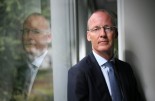MUFG: A brave move by the Bank of England
MUFG: A brave move by the Bank of England

After its surprise inaction in November, the Bank of England has now decided to pull the trigger and raise rates – despite the rapid spread of the Omicron variant. Here are the comments of Henry Cook, Economist at MUFG, on the Bank of England's decision.
While we had plenty of gripes around the communication before the meeting, it seemed reasonable to wait in November given uncertainty around the labour market following the end of the furlough scheme.
This week’s jobs data showed no discernible impact on unemployment post-furlough yet the MPC could easily have pointed to Omicron uncertainty to warrant holding fire once again. That the decision was still made to hike seems to be an indication that the BoE won’t actively be looking for excuses not to tighten policy in a way that we’ve often seen from central banks in the past.
The decision comes a day after the CPI release for November showed the highest rate of inflation for a decade (5.1%). The BoE now expects 5%+ inflation to continue through the winter before reaching a peak around 6% in April. So a back-to-back move with another hike in February seems a real possibility, especially if the Omicron wave proves to be sharp but short.
Today’s increase from 0.1% to 0.25% leaves rates 50bp below the pre-pandemic mark, so still a very accommodative setting. Three 25bp hikes in 2022 certainly can’t be ruled out, but we doubt this BoE will manage to get rates much beyond the 1% mark during this hiking cycle. At that point active balance sheet reduction would come into play.
Still, today’s lift-off is a brave call from the BoE, especially given that the MPC itself noted that the Omicron variant would 'unambiguously slow economic activity'. The latest caseload numbers certainly make for grim reading and any subsequent pressure on hospitals could force the government back towards tighter COVID-19 restrictions.
Even if restrictions remain as they are, high caseloads could prompt individuals to voluntarily reduce social contact. This would particularly affect customer-facing industries who may not be able to rely on as much, or indeed any, extra fiscal support this time around.









